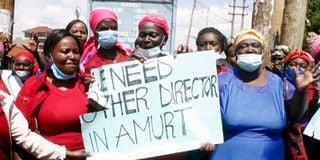It is time political parties protected Kenyan widow

Members of a CBO in Nairobi protest against the alleged assault of a widow champion in 2021.
What you need to know:
- There are an estimated eight million widows in the country, about 15 per cent of the population.
- Widows are rarely invited to participate in politics and their specific needs do not feature in party manifestos.
As Kenya gears towards the 2022 General Election, political parties are accelerating efforts to find and build alliances with different special interest groups. The usual patterns are at a play: It’s a mostly men affair.
So far, no woman has declared her candidacy to run for president. While that might change, even if a woman does run, she is unlikely to be a widow.
There are an estimated eight million widows in the country, about 15 per cent of the population. This is a big political voting bloc, yet widows are rarely invited to participate in politics and their specific needs do not feature in party manifestos.
In fact, while political parties consider other special needs groups — either by having a representative in their party or crafting a manifesto that addresses their needs — widows are simply lumped under “Women” despite their unique challenges. Left without representation that intimately understands their experiences, their needs are rarely met.
Unlike most other women, widows suffer stigma, regressive social norms that deny them body autonomy, disinheritance and so on. Last October, four elderly widows were burnt to death in Kisii County, accused of being witches. This month, a 70-year-old woman was killed in the region on similar claims, triggering violence that left six homes burnt down.
Being a woman politician in Kenya is challenging. According to an analysis of the 2017 General Election by various civil society groups, women vying for political seats are scrutinised more harshly than their male counterparts.
Ghost of dead husband
They are criticised for their age or discouraged from running because it’s “unbecoming” for a woman to hold political office. A married woman is more likely to garner respect and votes because of her status while an unmarried one is seen as inexperienced and incompetent.
But widows are even more disadvantaged. The ghost of her dead husband always looms over her and the stigma and discrimination against widows never go away. She will encounter damning questions: Did she not kill her husband? How did her husband die? Why is she in a new relationship so soon? Is there a man to guide her leadership? To the political elite this may seem trivial but to the voter, they shape opinion and inform voting decisions.
Perhaps to maximise on voter sympathy and retain the seat, widows have only been invited by political parties to replace their husbands. However, they rarely push for policies to address the widows’ needs.
Maybe the ‘widowhood curse’ shut them up. But political parties can change the fate of widows by developing widow-focused manifestos that address issues such as the need for inheritance laws, widow-cleansing bans and land tenure reforms.
More men than women are dying of Covid-19; hence, the number of widows is bound to increase. If gender equality and women empowerment mean anything to a political party, they should not ignore this critical group any more. Kenyan widows have the numbers: They should no longer be invisible.
Ms Orwa, a 2021 Aspen New Voices Fellow, is a widow champion and the founder and director of the Rona Foundation. [email protected]





